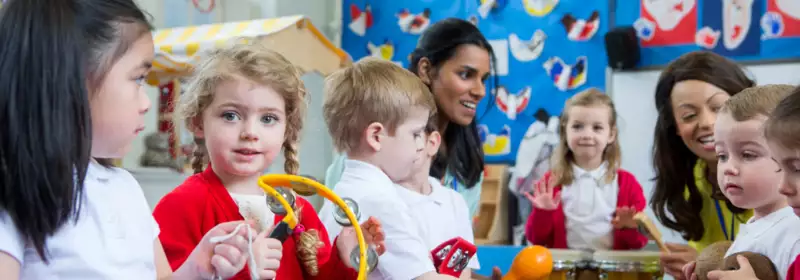Day-care workers guide children through their very first steps, literally and figuratively. You’ll help them develop physically as well as mentally and emotionally prepare them for primary education.
As a day-care worker you’ll be responsible for nurturing young children’s social development as early as a few months, until 5 years old. You’ll be teaching young children fundamental skills that they’ll carry with them throughout life.
No two days will be the same as a day-care worker, however, they’ll all be just as rewarding. You’ll be able to see how children develop and grow throughout their time under your supervision.
Day-care workers significantly impact a child’s early development, setting them up for success. If you possess the patience, energy and enthusiasm for children than a career in childcare is a solid choice.
Learn how to become qualified to work in day-care and how to start your childcare businesses.
Qualifications
To work in a day-care role you’ll need to have an NVQ level 2 in childcare education or playwork. To progress with your career and work as a manager you’ll need at least two years’ experience and an NVQ level 3 in childcare.
Level 2 and 3 qualifications are available from physical colleges or online learning providers. Level 2 is equivalent to GCSE level study and level 3 is equivalent to A Level study. This means you don’t have to go to university to become fully qualified.
This is ideal if you’re looking to move into childcare as you will be able to transition roles without a period of unemployment. Especially if you opt for an online learning provider as you’ll be able to earn whilst you learn.
Role & Responsibilities

As a day-care worker you’ll have a variety of tasks and responsibilities to adhere to whilst you work. Each day will bring new experiences as you’ll constantly be adapting to meet each child’s needs.
All day-care centres with children between the ages of a few months to 5 years old must follow the early years foundation stage (EYFS) development structure.
The EYFS guidelines came into force in 2008 and ensure a child’s learning is monitored through play. The developmental structure is designed for when children enter primary school. Primary school teachers then receive accurate information about the child’s development to ensure their specific needs are met early on in primary education.
Your day to day responsibilities could include:
- Organising schedules and routines
- Cleaning, feeding, changing nappies and cleaning rooms
- Follow EYFS guidelines and encourage age-appropriate learning and socializing
- Teach children basic skills and concepts such as sharing, manners and communication
- Monitoring children’s health, behaviours and emotions and reporting any concerns to staff/parents
- Introduce children to art, music, sports and other potential hobbies
- Encourage positive behaviours in children and provide discipline and guidance when needed
- Prepare children for entry into primary education
Throughout the year you will document a child’s progress and liaise with parents to achieve educational and behavioural goals.
Set up your own day-care
Working in day-care could open you up to possibly owning your own day-care centre one day. Despite being qualified there is still a few more steps before you can open up for business.
The government encourages parents to send their children to day-care to prepare them for primary school.
Attending pre-school at an early age prepares them academically and gets them used to being with other children. It encourages the discipline required during the school day as well as preparing them for the longer days.
Originally just about anyone could set up day-care but nowadays there are regulations in place.
This is to ensure the safety of our children as well as their progression academically. Day-cares need to be managed by qualified adults who follow Early Years Education and government guidelines.
You’ll also have to register with Ofsted and Early Years Education. When you submit your application Ofsted will:
- do background checks with local authorities
- check your references
- email you a unique reference number (‘URN’)
An inspector will visit you to check:
- your identity and qualifications - including first aid qualifications
- that you’re familiar with the early years foundation stage (EYFS) requirements and know how to put them into practice
- your level of English
Once you’ve been approved you’ll receive a certificate of registration with your unique reference number. Only after this point will you legally be permitted to open a day-care.
Your Premises
The location of your day-care needs to meet the size requirements for a premise. As well as the hygiene and cleanliness standards.
Your premise should be:
- 3.5m square per child under the age of two
- 2.5m square per child aged two
- 2.3m square per child aged 3 – 7
It is also important to consider parking when choosing a location to set up your day-care. This important for parents to drop off and pick-up their children with ease. Check with your local council if you need any permissions too.
The premises should include toys and educational aids. As well as places for toddlers and babies to play and learn safely. You may also need a Moses basket if you have very young babies in your care.
Health and safety requirements

Health and safety requirements are essential when setting up a childcare business. Following protocol protects the children as well as your establishment.
It’s your responsibility to carry out a health and safety risk assessment in the EYFS welfare requirement. The welfare requirements set out provisions for safeguarding children. It will also outline how to suitably recruit people, find and manage the right premises.
To meet environmental health requirements you’ll need to have employers liability insurance and have the certificate displayed. If food is prepared on the premises then you’ll also need to complete a food premises registration form.
Grants and help for start-up costs
Childminders are eligible for a start-up grant. This is to help with equipment and other start-up costs as long as you’ve contributed £100 into your business. All childminders are eligible and should apply for the grant as soon as they’re registered with Ofsted.
There may also be funding to help with start-up costs of setting up your own day-care business. It’s best to contact your local child care business support team to discuss your options. The amount you receive will depend on your location and the ages of the children that will be in your care.
If you want to work in childcare and one day start your own day-care then learndirect can help you with this exciting new venture.
learndirect is one of the UK’s leading online learning providers. We offer a range of courses from GCSEs to A Levels and more.
Our courses are guided by an experienced tutor and include flexible payment options to help you spread the cost.
You’re able to learn from the comfort of your own home and at a pace that’s right for you. For more information on how to prepare for your distance learning experience read our blog here.
If you’re ready to get back into education get in touch or browse our courses below.



















